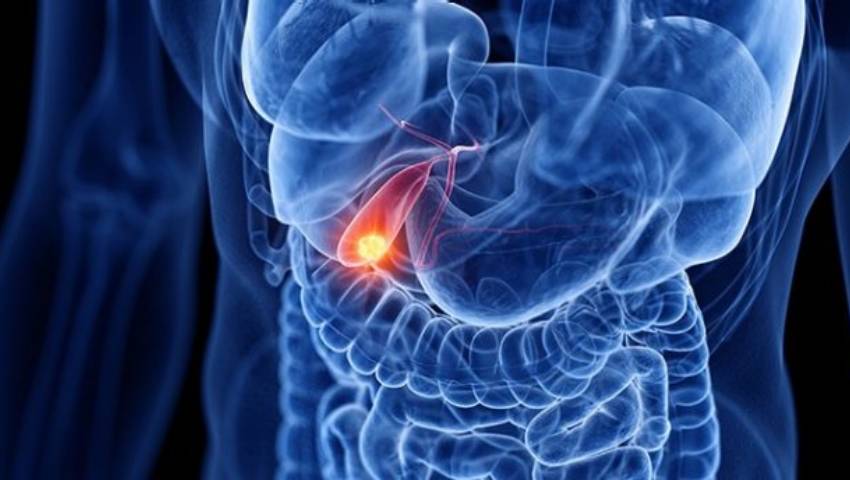
- 11/09/2024
- Dr. Pratik Patil
- 0 Comments
- Blog
Targeted Therapy and Immunotherapy for Gallbladder Cancer
As researchers learn more about the changes in cells that cause gallbladder cancer, they’ve developed drugs to target some of these changes. These targeted drugs work differently from standard chemotherapy (chemo) drugs. They sometimes work when standard chemo drugs don’t, and they often have different side effects.
FGFR2 inhibitors:
FGFRs (fibroblast growth factor receptors) are proteins on cells that help them grow and divide normally. A small number of people with gallbladder cancer have changes in the genes that make FGFRs, which result in abnormal FGFR proteins that cause cells to grow out of control and turn into cancer.
Pemigatinib (Pemazyre) and futibatinib (Lytgobi) are FGFR2 inhibitors. They block the abnormal FGFR2 protein in gallbladder cancer cells and keep them from growing and spreading to other places.
These drugs can be used to treat some advanced gallbladder cancers that cannot be removed by surgery or have spread to distant areas after at least one previous chemotherapy treatment. For these drugs to work, your cancer must have an abnormal FGFR2 gene, so your cancer will be tested before starting any of these drugs.
These medicines are taken by mouth as tablets, typically once a day.
IDH1 inhibitor:
In some people with gallbladder cancer, the cancer cells have a change (mutation) in the IDH1 gene, which normally helps cells make the IDH1 protein. Mutations in this gene can lead to an abnormal IDH1 protein, which can stop cells from maturing the way they normally would.
Ivosidenib (Tibsovo) is an IDH1 inhibitor. It blocks the abnormal IDH1 protein, which seems to help the cancer cells mature into more normal cells. This drug can be used in people with advanced, previously treated gallbladder cancer, if the cancer cells are found to have an IDH1 mutation. Your doctor can test your cancer cells to see if they have an IDH1 mutation.
This drug is taken by mouth, once a day.
Less common but more serious side effects can include changes in heart rhythm, pneumonia, and jaundice (yellowing of the eyes and skin).
NTRK inhibitor:
A very small number of gallbladder cancers have changes in one of the NTRK genes, called NTRK gene fusions. Cells with these gene changes make abnormal TRK proteins, which can lead to abnormal cell growth and cancer.
Larotrectinib (Vitrakyi) or entrectinib (Rozlytrek) are NTRK inhibitors. TRK inhibitors target and disable the proteins made by the NTRK genes. This drug can be used in people with advanced gallbladder cancer, who have not received prior systemic therapy.
These drugs are taken as pills, once or twice daily.
Possible side effects of NTRK inhibitors:
- Common side effects can include abnormal liver tests; decreased white blood cell and red blood cells; muscle and joint pain; tiredness; diarrhea or constipation; nausea and vomiting; and stomach pain.
- Less common but more serious side effects can include mental changes, such as confusion, changes in mood, changes in sleep; liver damage; changes in heart rhythm and/or function; vision changes; harm to a fetus.
RET inhibitor:
In a small percentage of gallbladder cancers, the tumor cells have a rearrangement in the RET gene that causes them to make an abnormal form of the RET protein. This abnormal protein helps the tumor cells grow.
Selpercatinib (Retevmo) or pralsetinib (Gayreto) are RET inhibitors and can be used to treat advanced gallbladder cancers with the RET rearrangement.
These drugs are taken by mouth as capsules, typically once or twice a day.
Possible side effects of RET inhibitors:
- Common side effects can include dry mouth, diarrhea or constipation, high blood pressure, tiredness, swelling in hands and/or feet, skin rash, muscle and joint pain, low blood cell counts, or changes in other blood tests.
- Less common but more serious side effects can include liver damage, lung damage, allergic reactions, changes in heart rhythm, bleeding easily, and problems with wound healing.
BRAF inhibitor:
In some gallbladder cancers, the cells have changes in the BRAF gene. Cells with these changes make an altered BRAF protein that helps them grow. Some drugs target this and related proteins. A combination of BRAF inhibitor and a MEK inhibitor is often given together to treat advanced cancer with the BRAF V600E mutation.
Dabrafenib (Tafinlar) is a BRAF inhibitor. Trametinib (Mekinist) is a MEK inhibitor. This drug combination can be used in people with advanced, previously treated gallbladder cancer, if the cancer cells are found to have an BRAF V600E mutation.
These drugs are taken as pills or capsules each day.
Possible side effects of BRAF inhibitor:
- Common side effects can include skin thickening, rash, itching, sensitivity to the sun, headache, fever, joint pain, tiredness, hair loss, nausea, and diarrhea.
- Less common but more serious side effects can include bleeding, heart rhythm problems, liver or kidney problems, lung problems, severe allergic reactions, severe skin or eye problems, increased blood sugar levels, and squamous cell skin cancer.
KRAS inhibitor:
In some gallbladder cancers, the cancer cells have changes in the KRAS gene called a KRAS G12C mutation. This mutation makes an abnormal form of the KRAS protein, which helps the cancer cells grow and spread. KRAS inhibitors attach to the KRAS G12C protein, which helps keep cancer cells from growing.
Adagrasib (Krazati) is a KRAS inhibitor and is used to treat advanced gallbladder cancer with the KRAS G12C mutation if you’ve already had at least one other type of drug treatment.
This drug is taken as a pill, typically twice a day.
Possible side effects of KRAS inhibitor:
- Common side effects can include diarrhea, nausea and vomiting, muscle pain, fatigue, cough, decreased white blood cell and red blood cell counts, and changes in other blood tests.
If you need targeted therapy and immunotherapy for gallbladder cancer, please book an appointment with our cancer specialist in Pune, Dr. Pratik Patil.
